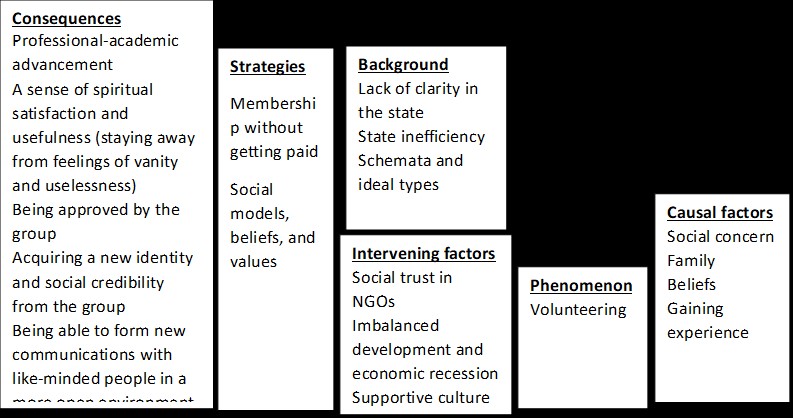Volume 24, Issue 95 (12-2024)
refahj 2024, 24(95): 385-419 |
Back to browse issues page
Download citation:
BibTeX | RIS | EndNote | Medlars | ProCite | Reference Manager | RefWorks
Send citation to:



BibTeX | RIS | EndNote | Medlars | ProCite | Reference Manager | RefWorks
Send citation to:
Bayat H, vosoughi M, Aghajani Mersa H. (2024). Exploring the sociological factors that contribute to individuals' voluntary work in charitable centers for child labor and street children in Tehran city. refahj. 24(95), : 10 doi:10.32598/refahj.24.95.4345.1
URL: http://refahj.uswr.ac.ir/article-1-4203-en.html
URL: http://refahj.uswr.ac.ir/article-1-4203-en.html
Keywords: Child Labor and Street Children, Civil Society Organizations, Voluntary Work, Social Capital, Social Participation.
Full-Text [PDF 882 kb]
(3523 Downloads)
| Abstract (HTML) (2813 Views)
Full-Text: (842 Views)
Extended abstract
Introduction
Governments in recent years have endeavored to delegate a portion of their executive tasks to NGOs, sometimes employing incentive policies to reduce the government’s workload and seek public support and volunteer participation in mitigating damages (Ekrani & Sahra, 2018).
Volunteers in each sector adopt various service approaches, such as providing continuous or periodic financial assistance through endowments, or donating books, toys, clothing, and other goods. Non-financial aid is also provided through activities in education, vocational training, social work, healthcare, and treatment.
Method
The research method employed in this study was based on the Grounded Theory Method (GTM). In the GTM, the sampling framework is targeted and theoretical rather than being statistical. Initially, interviews were conducted with officials from the Welfare Organization of Tehran Province and senior experts in the field of social issues and working street children. Subsequently, interviews continued with volunteers and managers of these organizations who had sufficient knowledge of the research topic, until theoretical saturation was achieved. Participants were selected for interviews if they had been actively volunteering in charitable organizations for at least one year without receiving any compensation. After theoretical saturation, additional interviews were conducted to confirm the findings.
In total, 22 interviews were conducted and recorded during this process. Out of this number, two of the interviewees contacted the researcher after their interviews and requested to withdraw from the study.
Data coding was carried out using MAXQDA software, leading to the development of the final paradigm model. In this research, a total of 1,761 pieces of data were collected and reduced to 58 core concepts.
Findings
In conclusion, based on the interviews conducted and the repetition of the term “volunteerism,” the following paradigm model was constructed.
Based on the research findings, all 18 individuals admitted that they randomly chose their field of activity and considered their entry into the field of working with working and street children as a coincidence. In conclusion, despite individuals’ concerns about social issues and their worries about the current economic, cultural, social, and political conditions in society, the goal of these volunteers seems to be mainly about integrating into a community, establishing social interactions with new people, gaining experience, creating a new identity, and seeking validation from a fairly structured society.
Discussion
The data obtained from the interviews can be broadly summarized in four dimensions:
1. Socio-Structural Dimension: The level of government transparency in development programs and policies, as well as the creation of mechanisms to encourage individual social participation through membership in non-governmental organizations.
2. Individual Dimension: Volunteers gain unique experiences in social participation and become familiar with organizational structure and challenges by joining non-governmental organizations.
3. Religious Dimension: Some forms of collective action draw their motivating force from fundamental values. Beliefs, value systems, religious, and ethical principles provide the necessary motivation for membership in these organizations.
4. Family Background Dimension: The actor, alongside endorsing societal values, cultivates a sense of belonging to a group, forges a new social identity, and acquires social approval, which is instrumental in personal growth and effectiveness.
Ethical considerations
Author Consideration
The author put 10 month’s of his time to review all papers and their reference cited
Funding
The present sudy did not have any sponsors.
Conflicts of interes
The authors declared no conflict of interes.
Following the ethics of research
In this article, all rights relating to references are cited and resources are carefully
lised.
Introduction
Governments in recent years have endeavored to delegate a portion of their executive tasks to NGOs, sometimes employing incentive policies to reduce the government’s workload and seek public support and volunteer participation in mitigating damages (Ekrani & Sahra, 2018).
Volunteers in each sector adopt various service approaches, such as providing continuous or periodic financial assistance through endowments, or donating books, toys, clothing, and other goods. Non-financial aid is also provided through activities in education, vocational training, social work, healthcare, and treatment.
Method
The research method employed in this study was based on the Grounded Theory Method (GTM). In the GTM, the sampling framework is targeted and theoretical rather than being statistical. Initially, interviews were conducted with officials from the Welfare Organization of Tehran Province and senior experts in the field of social issues and working street children. Subsequently, interviews continued with volunteers and managers of these organizations who had sufficient knowledge of the research topic, until theoretical saturation was achieved. Participants were selected for interviews if they had been actively volunteering in charitable organizations for at least one year without receiving any compensation. After theoretical saturation, additional interviews were conducted to confirm the findings.
In total, 22 interviews were conducted and recorded during this process. Out of this number, two of the interviewees contacted the researcher after their interviews and requested to withdraw from the study.
Data coding was carried out using MAXQDA software, leading to the development of the final paradigm model. In this research, a total of 1,761 pieces of data were collected and reduced to 58 core concepts.
Findings
In conclusion, based on the interviews conducted and the repetition of the term “volunteerism,” the following paradigm model was constructed.
Paradigm Model


Based on the research findings, all 18 individuals admitted that they randomly chose their field of activity and considered their entry into the field of working with working and street children as a coincidence. In conclusion, despite individuals’ concerns about social issues and their worries about the current economic, cultural, social, and political conditions in society, the goal of these volunteers seems to be mainly about integrating into a community, establishing social interactions with new people, gaining experience, creating a new identity, and seeking validation from a fairly structured society.
Discussion
The data obtained from the interviews can be broadly summarized in four dimensions:
1. Socio-Structural Dimension: The level of government transparency in development programs and policies, as well as the creation of mechanisms to encourage individual social participation through membership in non-governmental organizations.
2. Individual Dimension: Volunteers gain unique experiences in social participation and become familiar with organizational structure and challenges by joining non-governmental organizations.
3. Religious Dimension: Some forms of collective action draw their motivating force from fundamental values. Beliefs, value systems, religious, and ethical principles provide the necessary motivation for membership in these organizations.
4. Family Background Dimension: The actor, alongside endorsing societal values, cultivates a sense of belonging to a group, forges a new social identity, and acquires social approval, which is instrumental in personal growth and effectiveness.
Ethical considerations
Author Consideration
The author put 10 month’s of his time to review all papers and their reference cited
Funding
The present sudy did not have any sponsors.
Conflicts of interes
The authors declared no conflict of interes.
Following the ethics of research
In this article, all rights relating to references are cited and resources are carefully
lised.
Type of Study: orginal |
Received: 2023/05/3 | Accepted: 2024/07/22 | Published: 2024/12/30
Received: 2023/05/3 | Accepted: 2024/07/22 | Published: 2024/12/30
Send email to the article author
| Rights and permissions | |
 |
This work is licensed under a Creative Commons Attribution-NonCommercial 4.0 International License. |








